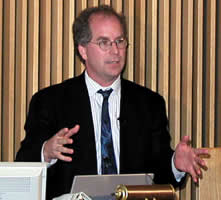English Corner

"There's a huge room of records that no one seems to use anymore."
Creator: Roboppy
http://creativecommons.org/licenses/by-nc/2.0/deed.de
Source: Flickr.com
KlausGraf - am Freitag, 31. August 2007, 19:34 - Rubrik: English Corner
noch kein Kommentar - Kommentar verfassen

Closed Book With Clasps On The Lap Of Robert Ingersoll Aitken's "Past," On The North Side Of The National Archives (Washington, DC)
Creator: Takomabibelot
License: CC-BY 2.0
Source: Flickr.com
KlausGraf - am Freitag, 31. August 2007, 19:27 - Rubrik: English Corner
noch kein Kommentar - Kommentar verfassen
The exhibit, "From Alchemy to Chemistry: 500 Years of Rare and Interesting Books," was co-curated by Tina Chrzastowski, Vera Mainz, and Gregory Girolami. The list of exhibited items is shown below. About two thirds of these items are now available in full on the internet in one or another edition. Links are shown after each available item.
http://web.lemoyne.edu/~GIUNTA/exhibit.html

http://web.lemoyne.edu/~GIUNTA/exhibit.html

KlausGraf - am Freitag, 31. August 2007, 19:15 - Rubrik: English Corner
noch kein Kommentar - Kommentar verfassen
http://blog.myfinebooks.com/2007/08/heritage-books-.html
My August issue of Rare Book Review just arrived which confirms the announcement made on this blog in July that Heritage Book Shop's inventory has been sold to Bloomsbury Auctions. The magazine estimates that the inventory is worth $10 million. I suspect this is a good source because Bernard Shapero, the London bookseller, owns both Rare and Bloomsbury. If they can't get a scoop, who can?
See also
http://archiv.twoday.net/stories/3945255/ (in German)
http://www.histsem.uni-freiburg.de/mertens/graf/dondig_e.htm
My August issue of Rare Book Review just arrived which confirms the announcement made on this blog in July that Heritage Book Shop's inventory has been sold to Bloomsbury Auctions. The magazine estimates that the inventory is worth $10 million. I suspect this is a good source because Bernard Shapero, the London bookseller, owns both Rare and Bloomsbury. If they can't get a scoop, who can?
See also
http://archiv.twoday.net/stories/3945255/ (in German)
http://www.histsem.uni-freiburg.de/mertens/graf/dondig_e.htm
KlausGraf - am Freitag, 31. August 2007, 18:47 - Rubrik: English Corner
noch kein Kommentar - Kommentar verfassen
Prolific French historian Roger Chartier’s new book, Inscription and Erasure: Literature and Written Culture from the Eleventh to the Eighteenth Century, trans. Arthur Goldhammer (Philadelphia: University of Pennsylvania Press, 2007), considers the tension between preservation and obliteration in literary texts. Chartier starts the book with this assessment: “The fear of obliteration obsessed the societies of early modern Europe. To quell their anxiety, they preserved in writing traces of the past, remembrances of the dead, the glory of the living, and texts of all kinds that were not supposed to disappear.” Chartier continues, “This was no easy task in a world where writing could be erased, manuscripts misplaced, and books existed under perpetual threat of destruction” (p. vii). In other words, it was a period much like our own.
Those interested in the archival impulse will find references in his literary analysis that are of interest, with considerations to the use of wax tablets as the main means of writing in the medieval period, the emergence of autograph signatures and the use of scribes, the availability of printed almanacs with blank pages for personal recordkeeping, the use of handwritten newsletters, and the rise and impact of printed texts.
Read the rest of Professor Richard Cox' weblog entry at
http://readingarchives.blogspot.com/2007/08/fear-of-oblivion.html
Those interested in the archival impulse will find references in his literary analysis that are of interest, with considerations to the use of wax tablets as the main means of writing in the medieval period, the emergence of autograph signatures and the use of scribes, the availability of printed almanacs with blank pages for personal recordkeeping, the use of handwritten newsletters, and the rise and impact of printed texts.
Read the rest of Professor Richard Cox' weblog entry at
http://readingarchives.blogspot.com/2007/08/fear-of-oblivion.html
KlausGraf - am Mittwoch, 29. August 2007, 19:18 - Rubrik: English Corner
noch kein Kommentar - Kommentar verfassen
http://cityscape.inf.cs.cmu.edu/bungee/
Web search engines have attracted widespread demand for information retrieval from unstructured documents. The number of structured and semi-structured documents available on the Web is also huge, and collections of these are more amenable to data mining. Yet there has been no similar explosion of interest in this kind of exploration. Finding patterns in databases of political contributions, environmental data, or hospital and school performance would surely interest many citizens. The main research question for this project is how to support such exploration for users with little or no training in statistics or programming. In contrast to other data-mining systems, Bungee View focuses on learnability, responsiveness, robustness, and providing a satisfying user experience.
Via
http://www.huygensinstituut.knaw.nl/weblog/ (Dutch)
Web search engines have attracted widespread demand for information retrieval from unstructured documents. The number of structured and semi-structured documents available on the Web is also huge, and collections of these are more amenable to data mining. Yet there has been no similar explosion of interest in this kind of exploration. Finding patterns in databases of political contributions, environmental data, or hospital and school performance would surely interest many citizens. The main research question for this project is how to support such exploration for users with little or no training in statistics or programming. In contrast to other data-mining systems, Bungee View focuses on learnability, responsiveness, robustness, and providing a satisfying user experience.
Via
http://www.huygensinstituut.knaw.nl/weblog/ (Dutch)
KlausGraf - am Mittwoch, 22. August 2007, 23:33 - Rubrik: English Corner
noch kein Kommentar - Kommentar verfassen
http://www.archivesnext.com/?p=64
The most recent issue of American Libraries has an article by Laura B. Cohen called “A Manifesto for Our Times.” Ms. Cohen is a library blogger, and last November she published “A Librarian’s 2.0 Manifesto” on her blog. The article itself is short, but interesting, as is the manifesto.
So, fellow archivists, below is the librarian’s manifesto, shameless copied and modified minimally for us. I ask you, can we adopt this? What changes would we need?
* I will recognize that the universe of information culture is changing fast and that archives need to respond positively to these changes to provide resources and services that users need and want.
* I will educate myself about the information culture of my users and look for ways to incorporate what I learn into the services my archives provides.
* I will not be defensive about my archives, but will look clearly at its situation and make an honest assessment about what can be accomplished.
* I will become an active participant in moving my archives forward.
* I will recognize that archives change slowly, and will work with my colleagues to expedite our responsiveness to change.
* I will be courageous about proposing new services and new ways of providing services, even though some of my colleagues will be resistant.
* I will enjoy the excitement and fun of positive change and will convey this to colleagues and users.
* I will let go of previous practices if there is a better way to do things now, even if these practices once seemed so great.
* I will take an experimental approach to change and be willing to make mistakes.
* I will not wait until something is perfect before I release it, and I’ll modify it based on user feedback.
* I will not fear Google or related services, but rather will take advantage of these services to benefit users while also providing excellent services that users need.
* I will avoid requiring users to see things in archivists’ terms but rather will shape services to reflect users’ preferences and expectations.
* I will be willing to go where users are, both online and in physical spaces, to practice my profession.
* I will create open Web sites that allow users to join with archivists to contribute content in order to enhance their learning experience and provide assistance to their peers.
* I will lobby for an open catalog that provides personalized, interactive features that users expect in online information environments.
* I will encourage professional blogging in my archives.
* I will validate, through my actions, archivists’ vital and relevant professional role in any type of information culture that evolves.
I think the only addition we may need is a point about exploring the issues related to including records produced by 2.0 in our collections.
What issues do you see here–or are you ready to sign on right now?
The most recent issue of American Libraries has an article by Laura B. Cohen called “A Manifesto for Our Times.” Ms. Cohen is a library blogger, and last November she published “A Librarian’s 2.0 Manifesto” on her blog. The article itself is short, but interesting, as is the manifesto.
So, fellow archivists, below is the librarian’s manifesto, shameless copied and modified minimally for us. I ask you, can we adopt this? What changes would we need?
* I will recognize that the universe of information culture is changing fast and that archives need to respond positively to these changes to provide resources and services that users need and want.
* I will educate myself about the information culture of my users and look for ways to incorporate what I learn into the services my archives provides.
* I will not be defensive about my archives, but will look clearly at its situation and make an honest assessment about what can be accomplished.
* I will become an active participant in moving my archives forward.
* I will recognize that archives change slowly, and will work with my colleagues to expedite our responsiveness to change.
* I will be courageous about proposing new services and new ways of providing services, even though some of my colleagues will be resistant.
* I will enjoy the excitement and fun of positive change and will convey this to colleagues and users.
* I will let go of previous practices if there is a better way to do things now, even if these practices once seemed so great.
* I will take an experimental approach to change and be willing to make mistakes.
* I will not wait until something is perfect before I release it, and I’ll modify it based on user feedback.
* I will not fear Google or related services, but rather will take advantage of these services to benefit users while also providing excellent services that users need.
* I will avoid requiring users to see things in archivists’ terms but rather will shape services to reflect users’ preferences and expectations.
* I will be willing to go where users are, both online and in physical spaces, to practice my profession.
* I will create open Web sites that allow users to join with archivists to contribute content in order to enhance their learning experience and provide assistance to their peers.
* I will lobby for an open catalog that provides personalized, interactive features that users expect in online information environments.
* I will encourage professional blogging in my archives.
* I will validate, through my actions, archivists’ vital and relevant professional role in any type of information culture that evolves.
I think the only addition we may need is a point about exploring the issues related to including records produced by 2.0 in our collections.
What issues do you see here–or are you ready to sign on right now?
KlausGraf - am Montag, 20. August 2007, 22:24 - Rubrik: English Corner
noch kein Kommentar - Kommentar verfassen
Va. Tech Archives 60,000 Items Sent as Condolences
http://www.washingtonpost.com/wp-dyn/content/article/2007/08/18/AR2007081800588.html?referrer=emailarticle

http://www.washingtonpost.com/wp-dyn/content/article/2007/08/18/AR2007081800588.html?referrer=emailarticle

KlausGraf - am Sonntag, 19. August 2007, 18:06 - Rubrik: English Corner
noch kein Kommentar - Kommentar verfassen
KlausGraf - am Freitag, 17. August 2007, 21:39 - Rubrik: English Corner
noch kein Kommentar - Kommentar verfassen
KlausGraf - am Donnerstag, 16. August 2007, 01:35 - Rubrik: English Corner
noch kein Kommentar - Kommentar verfassen

